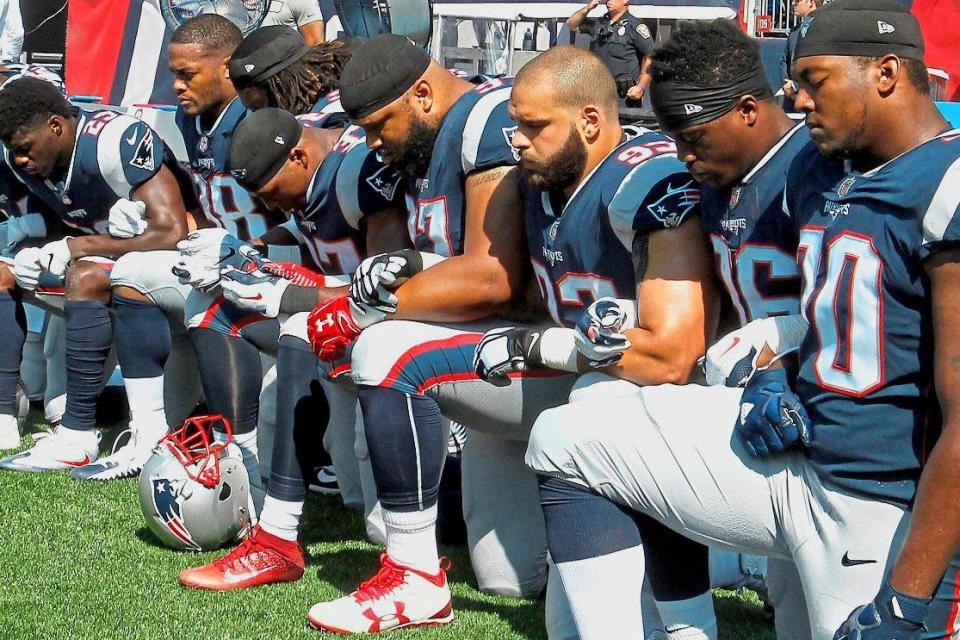Why sport protests matter

A line runs from the Olympic Stadium, Mexico City, in 1968 to Wembley Stadium, London, in 2017. The line does not begin in Mexico, nor does it end in London. It passes through Berlin in 1936, Atlanta in 1970, Johannesburg in 1995 and many other places besides, joining the moments when sport has served as a vehicle for civil justice.
On Sunday, the line passed not only through Wembley, but also through Detroit, Chicago, Atlanta and Washington, where American football players on an NFL Sunday stayed in their locker rooms or kneeled or joined arms during their national anthem: peaceful gestures of sympathy with black Americans who have suffered police brutality; a show of solidarity with the currently unemployed quarterback Colin Kaepernick, who began the #takeaknee protest; and a rebuke to president Trump.
I am in the US at the moment and the mood is very, very strange. We read much about the divided nation, but I have mostly encountered weariness with the superabundance of news. No doubt there are people who want to fight the Civil War all over again, and Americans plainly hold sharply polarised views on the NFL protests, especially on social media.
But wherever I watched televised NFL games this weekend, I noticed an almost British reserve. People shrugged: here we go again. The most extreme reaction I have encountered: in an airport restaurant on Sunday, the manager turned off the television for the anthem before the Pittsburgh Steelers v Chicago Bears match, switching it back on after the game was a few minutes old. No explanation, no discussion. Either politics and sport didn’t mix, or he didn’t want his diners getting indigestion.
Yet the NFL protests are all over the news, and this is probably deliberate. Guess what: Trump smears football at the very moment he needs covering fire for his amended Muslim travel ban. How better to get Americans looking the other way than to politicise the nation’s favourite sport, painting protesters as anti-patriotic traitors? The president has the moral cares of an insect, but he knows how middle America thinks.
The reason sport has been so readily politicised over the years is that it is visual, popular and language-neutral. Its values are those of the struggle, and its audiences are primed to care. Sport is spectacle, and sports fans are, by definition, ready to watch. Hence China spends tens of billions hosting the 2008 Beijing Olympics. Hence Russia and Qatar finagle themselves a football World Cup. Hence every time you turn on the TV to watch sport, you are sold something else - a car, a hamburger, a betting app, a culture war.
That, then, is the meta-story: the sporting information war. But it is also too cynical an analysis. Because while Trump is plainly trying to manipulate the population by rodeoing on the back of the NFL, it is also true that what happened on Sunday matters.
The line of historical sporting protest does not only conjoin protesters. It also connects those who have opposed equal treatment for all people. Whatever Trump intended via his NFL comments, the fact remains that last week he went to Alabama, the one-time racist heartland of the American South, and called black protesters “sons of bitches”. Earlier this year, he described neo-Nazis in Charlottesburg as including some “fine people”, and he has explicitly encouraged the police brutality that Kaepernick and his supporters oppose. Trump has recommended that the NFL fire players whom he says disrespect the nation by making their voices heard lawfully, peaceably and in public. The comparisons with Nazism and apartheid are not hyperbolic.
In historical terms, this is why the NFL protests are not treacherous, sackable offences. And their opponents, however patriotic their intentions, find themselves in the awkward company of those who applauded when Tommie Smith and John Carlos were tossed out of the 1968 Games; those who supported apartheid and were sickened to see Nelson Mandela award a Rugby World Cup to the rehabilitated national side; those who wanted Muhammad Ali banned from boxing forever; and, yes, those who were so irked at the performances of Jesse Owens at the 1936 Berlin Games.
The grossest thing is that Trump probably doesn’t care. But there are millions who do: and the NFL protestors this weekend have given them a voice. That is what sporting protest is for. That is why what happened on Sunday is important.

 Yahoo Sport
Yahoo Sport 





































